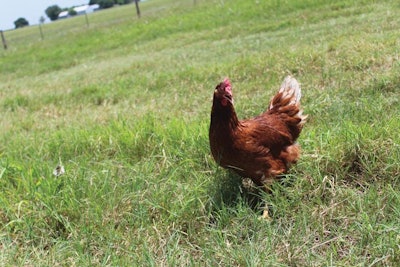
Originated in 1991 and based in Colorado, NestFresh works with more than 60 family farms in 12 states.
"This nationwide network helps us produce eggs in a flexible, sustainable system that also helps the livelihood of small farmers and those farmers' abilities to support their local economy and community," said Sotheary Hom, marketing manager at NestFresh.

Sotheary Hom is the marketing manager at NestFresh. (Courtesy NestFresh)
This system enables small farms to compete with the nation's largest producers. It also provides consumers with fresh, local eggs, she said.
NestFresh prides itself on producing eggs that are certified cage free, free range, humanely treated and non-GMO.
Non-GMO-verified eggs
NestFresh produced the first egg to become Non-GMO Project verified.
"In doing so, we actively worked with the third-party verifying company to create an effective program for future egg brands that choose to commit to becoming verified as well," Hom said.
She said the company understands that there are no genetically modified chickens or eggs in the market.
"While chickens and eggs themselves are not genetically modified, most chickens in North America are raised on a combination of corn, alfalfa, soy and canola – crops that are very likely to come from GMOs," said Hom.
She added that the bulk of genetically engineered crops in the U.S. are used to feed livestock and that the Non-GMO Project seal requires ongoing GMO testing of feed at farms.
"Avoiding products of animals raised on GMO feed is an effective way to reduce GMO use and contamination," she said.
NestFresh believes that non-GMO testing is about testing each ingredient, not just a product.
"This means the quality of food the hens consume truly matters. Knowing such, each of our farms is handpicked based on a commitment to animal welfare, land and local production," said Hom.
The company follows veterinarian guidance to maintain flock health.
"Prevention is very important to us. We ensure that we are providing our hens with healthy diets and clean water without the use of antibiotics."
Sustainability
NestFresh believes that one of the greatest benefits of its business model is that it reduces the carbon footprint it leaves behind.
"With producers across the nation providing eggs for their local communities, valuable natural resources are not wasted on transporting or refrigerating eggs for long periods. Instead, eggs move from nest to grocery to table with a minimal impact on the environment and maximum fuel and energy efficiency," she said.
The company does not grow or mill its own feed. Instead, it works and sources from feed mills that adhere to the Non-GMO Project standards.
NestFresh offers organic eggs to its consumers to avoid "pesticides and other harmful chemicals" that leave a negative impact on people and places around them, Hom said.

Layers at NestFresh have access to natural light and foraging. (Courtesy NestFresh)
Layers at NestFresh can "enjoy natural light and foraging, reducing the farms' dependence on the energy used to provide artificial light and produce and ship outside feed," said Hom. The company believes that these natural solutions allow them to produce higher-quality eggs, raise healthy chickens and a healthier Earth.
The farms do not grade and pack their own eggs. It works with farmers that are local to its processing/packing facilities.
Natural ventilation
When weather permits, farm managers open the windows for natural ventilation on NestFresh farms.
"One of the many benefits of natural ventilation is that we are reducing the amount of energy that we would need if we were operating fans. One of the weaknesses of natural ventilation is that there are times we have found water in our barns," she said.
Natural ventilation can be a challenge in the colder months; the same can be true when addressing free-range access.
To address that issue, Hom said: "We ensure that we are following the practices set by our third-party animal welfare certifier to allow our hens to roam free and forage outdoors when weather permits."

















